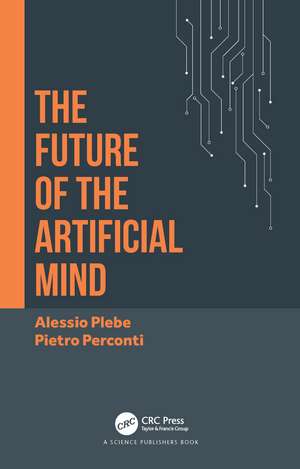The Future of the Artificial Mind
Autor Alessio Plebe, Pietro Percontien Limba Engleză Paperback – 9 iun 2022
The book reviews the key ideas that have enabled these goals to be achieved and their historical origins. The book also considers some of the ethical and social challenges that the future development of artificial intelligence will face. Will humans fall in love with future android dolls? What will artificial sex be like? And what will it be like to travel in cars that will treat us as passengers instead of drivers? But predicting the future appears more magic than science. But when it comes to artificial intelligence, it is a constant temptation. Since it is well known that "the only way to get rid of a temptation is to enjoy it!", the hypothesis considered in the last chapter is that emerging trends point to a near future in which intelligence will be ubiquitous, but it will be difficult to identify its bearer. We may be heading towards an era of widespread intelligence, but an intelligence without accountability.
| Toate formatele și edițiile | Preț | Express |
|---|---|---|
| Paperback (1) | 780.70 lei 6-8 săpt. | |
| CRC Press – 9 iun 2022 | 780.70 lei 6-8 săpt. | |
| Hardback (1) | 2064.21 lei 6-8 săpt. | |
| CRC Press – 9 iun 2022 | 2064.21 lei 6-8 săpt. |
Preț: 780.70 lei
Preț vechi: 952.07 lei
-18% Nou
Puncte Express: 1171
Preț estimativ în valută:
149.39€ • 159.75$ • 124.56£
149.39€ • 159.75$ • 124.56£
Carte tipărită la comandă
Livrare economică 17 aprilie-01 mai
Preluare comenzi: 021 569.72.76
Specificații
ISBN-13: 9780367638276
ISBN-10: 0367638274
Pagini: 254
Ilustrații: 7 Tables, black and white; 35 Line drawings, black and white; 7 Halftones, black and white; 42 Illustrations, black and white
Dimensiuni: 156 x 234 x 14 mm
Greutate: 0.4 kg
Ediția:1
Editura: CRC Press
Colecția CRC Press
ISBN-10: 0367638274
Pagini: 254
Ilustrații: 7 Tables, black and white; 35 Line drawings, black and white; 7 Halftones, black and white; 42 Illustrations, black and white
Dimensiuni: 156 x 234 x 14 mm
Greutate: 0.4 kg
Ediția:1
Editura: CRC Press
Colecția CRC Press
Notă biografică
Alessio Plebe received a degree in Electronic Engineering in 1981 from the University of Rome and a PhD degree in Philosophy of Language from the University of Palermo in 2004. He is Full Professor in Philosophy of Science at the Department of Cognitive Science of the University of Messina. His main research areas are neural computation, its epistemology, and its explanatory power for several cognitive functions. He has developed realistic neural models of visual object recognition, early language acquisition, and moral behaviour. Currently, he is researching the rise of deep learning, its causes and its impact on philosophy and cognitive science.
Pietro Perconti is Full Professor of Philosophy of Mind at the University of Messina, Italy, where he is also head of the Department of Cognitive Science. Perconti studied philosophy at the Universities of Palermo and Berlin (Freie Universität) and received a PhD in Philosophy of Language from the University of Palermo in 1996. His first book is devoted to history of ideas (Kantian Linguistics, 1999). Now his main research fields are social cognition, consciousness, and the social role of cognitive science.
Pietro Perconti is Full Professor of Philosophy of Mind at the University of Messina, Italy, where he is also head of the Department of Cognitive Science. Perconti studied philosophy at the Universities of Palermo and Berlin (Freie Universität) and received a PhD in Philosophy of Language from the University of Palermo in 1996. His first book is devoted to history of ideas (Kantian Linguistics, 1999). Now his main research fields are social cognition, consciousness, and the social role of cognitive science.
Cuprins
Introduction 1. The Landscape 2. When the Computer First Meets the Mind 3. The Early Shaping of Cognitive Science by Artificial Intelligence 4. Contending Philosophical Frameworks Within Artificial Intelligence 5. An Unexpected Renaissance Age 6. Humans, Machines, and Social Cognition 7. Towards the Hardest Things
Descriere
The book reviews social and technological challenges posed by the new wave of artificial intelligence from a technical and a cognitive perspective, and their historical origins. It also considers some of the ethical and social challenges that the future development of artificial intelligence will face.
